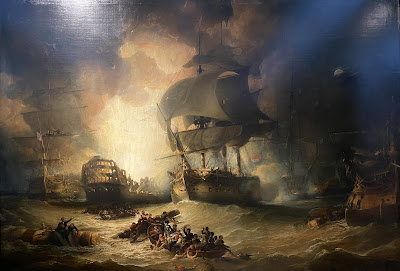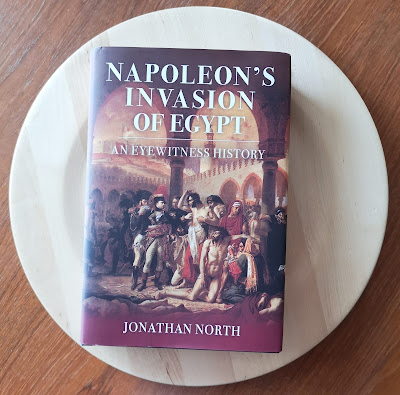Did Napoleon’s troops fire cannons at the pyramids of Egypt? And what was his army doing there?
Those were questions provoked by the teaser trailer for the 2023 movie Napoleon. The second of these questions is answered by this new book by Jonathan North, Napoleon’s Invasion of Egypt.
The book’s subtitle, ‘An Eyewitness History’, promises a wealth of firsthand accounts from the French invasion and occupation of a corner of North Africa. It delivers on that promise. This is a compelling account of that French adventure, told in the words of many who were there.
 |
| Napoleon at Arcole from The Life of Napoleon Bonaparte by W Sloane 1896 |
An introduction to Napoleon’s occupation of Egypt
While it’s titled the ‘Invasion of Egypt’, Jonathan North’s book covers the full period of the French occupation. Napoleon and his army arrived in July 1798 and the survivors left three years later, in 1801. Bonaparte himself effectively abandoned his troops in late 1800, sailing back to France, somehow evading the British Royal Navy.
The expedition was sent by the Directory, the committee that ruled revolutionary France. Their star general, Napoleon, proposed it, with a view to opening a land route to India.
It was also to be a scientific expedition, taking scholars to examine the marvels of ancient Egypt. Their discovery of the Rosetta Stone, the key to deciphering Egyptian writing, helped to open up the field of Egyptology.
Napoleon and his army landed in Egypt on 1 July 1798 and was immediately engaged in fighting the occupying Mamelukes, rulers of Egypt under the distant auspices of the Ottoman Empire.
‘The boats were rowed to the shore and a mass of cavalry showed itself and seemed ready to wade into the sea to oppose the landing. A few rounds of artillery saw them off,’ wrote 18- year-old soldier Joseph Laporte.1
The Battle of the Pyramids on 21 July inflicted a heavy defeat on the Mamelukes, allowing Napoleon to enter Cairo and commence his occupation of Egypt.
Despite sweeping in as victorious invaders, in only days the French became a beleaguered garrison. On 1 August 1798 a British fleet, under Horatio Nelson, defeated the warships of the French fleet that had transported the army across the Mediterranean, at the Battle of the Nile. The victory put the British in command of the sea, making it unlikely that the plan to reach India could be fulfilled.
‘We realised that any communication with Europe would now be impossible,’ wrote Captain Etienne Louis Malus in his journal. ‘We began to lose hope that we would ever see our homeland again.’2
 |
| The Destruction of L'Orient at the Battle of the Nile 1 August 1798 by G Arnald (1825-7) at National Maritime Musuem Photo A Knowles (2022) |
Occupation and assimilation
Napoleon set up a French administration of Egypt that included some of the local rulers, and established a scientific Institute. During their time in Cairo the French attempted to replicate something of their culture from home, including street cafes. Some adopted a local style of dress, partly because of the climate.
The French invasion force was almost exclusively male. It wasn’t long before soldiers began to find mistresses among the local population. General Menou married a Muslim woman and converted. He seemed to be one of the few who would have preferred to remain in Egypt indefinitely.
Most did not feel the same way. Etienne Geoffroy Saint-Hilaire, a young scholar, wrote:
The soldiers yearn for the delights of France. Their hatred for Egypt stems from being denied essentials. They have only water to drink. They cannot be attracted to women who hide themselves in veils.3
North’s book goes into considerable details about the challenges faced by the French as they experienced life in a different climate and culture. Scorpions, slavery, plague, mirages and mummies are all discussed, often in the words of eyewitnesses.
The end of the Egyptian adventure
To help protect Egypt, Napoleon’s army ventured into Syria and reached the Holy Land in 1799. Unable to capture the city of Acre, defended with British help, he had to turn back.
By now Napoleon sought a return to France, knowing he would be welcomed by the people. His departure was kept secret from almost all his officers and when they discovered he’d gone, many felt abandoned in a strange, unwelcoming land.
The remaining French army, significantly reduced by death and disease, began looking for its own way home. They continued to fight off local revolts and attacks by the Ottomans. On 21 March 1801 they were defeated by the British at the Battle of Alexandria, after which many were repatriated to France in British ships.
The British kept many of the artefacts discovered by the French in Egypt, including the Rosetta Stone.
A page-turning eyewitness account
This is my kind of history book—a strong story illustrated with an extensive tapestry of quotes from those who experienced it firsthand. Letters, journals and reports provide a rich seam of material which North has used to great effect.
I would like to have heard more from those being occupied. How did they feel about this French army inserting itself into their world? I’m guessing that sources for this are limited, hence their scant use.
The book contains a number of illustrations and maps, along with a detailed bibliography. The index only seems to include names of people—not places or key subjects. There’s a separate list of the around 40 eyewitnesses whose words are included in the book (presumably all translated).
This book has a high, and sometimes gruesome, body count. Thousands died, both soldiers and civilians. Battles, executions, revolts, raids, assassinations and plague all contributed to the carnage, and both sides carried out massacres.
I recommend this book to anyone who’s interested in the history of Napoleon or that of France or the Middle East in the period. It’s packed with fascinating details and has certainly helped me better understand Bonaparte himself, along with how Egypt became a subject of fascination during the Regency period.
Napoleon's Invasion of Egypt is available from Amberley Publishing.
Andrew Knowles researches and writes about the Regency and late Georgian period. He's also a freelance editor and writer for business. He lives in the beautiful Georgian seaside town of Weymouth, Dorset, on the south coast of England, with his wife, Rachel.
If you found this article interesting or useful, and you want to encourage us, help us to keep our research freely available by buying us a virtual cup of coffee. Click the button below.
Notes – all quotes from Napoleon’s Invasion of Egypt
1. p49
2. p99
3. p114
All photos © A Knowles RegencyHistory.net



No comments:
Post a Comment